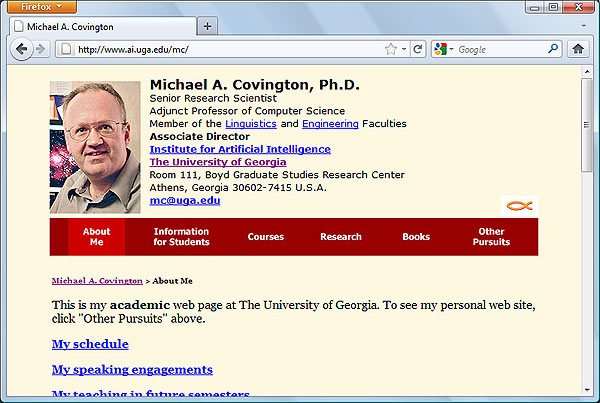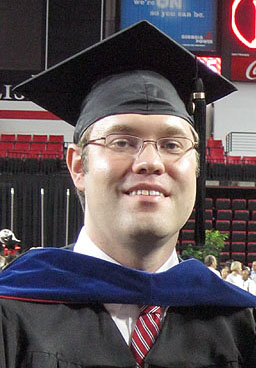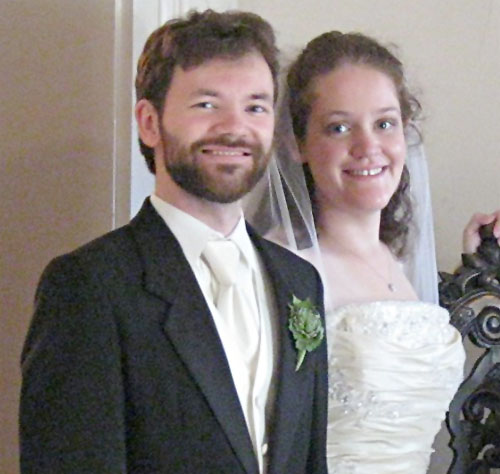 |
|
 |
2011
August
28-31
|
A watch that listens to the radio
 Lots more astrophotos are coming, as well as some discoveries about
software to process them, but I'll close out the month by telling you
about my new watch.
Lots more astrophotos are coming, as well as some discoveries about
software to process them, but I'll close out the month by telling you
about my new watch.
My trusty old 2005-vintage Casio A178W
finally gave up the ghost, and after thinking about
buying an exact replacement, I decided to upgrade.
The new
one is a "Waveceptor," which means it picks up
longwave radio signals from the National Bureau of Standards and sets itself.
It won't pick them up while I'm wearing it. It has to be horizontal and near a window
or (for some reason) near the east wall of my house.
Casio wants me to take it off and put it on the table every night so that it can listen for
signals at midnight, 1 a.m., 2 a.m., etc., until it gets a good signal. The signals are present
all the time, but stronger at night.
I don't do that. Being nearsighted, I wear my watch to bed, because I can't see a clock
across the room. Accordingly, I've turned off auto-setting. Instead, every couple of days,
I take the watch off and press the button to make it set itself.
Like other watches I've enjoyed, this one has a good ink-to-information ratio, and
(a necessity for astrophotographers) it has a stopwatch that is not disturbed by turning
on the backlight.
Permanent link to this entry


|
2011
August
25-27
|
Some co-authored astrophotos
Douglas Downing is here for a visit, and we did some astrophotography on the
evening of the 25th, using his Canon XS camera with my 300-mm lens and autoguided
telescope. The sky was none too clear — it started off reasonable and got
worse as one of the bands of Hurricane Irene approached us. These were done in
Athens, Georgia, under magnitude 4.5 skies.
Comet C/2009 P1 (Garradd) next to star cluster M71:

Single 3-minute exposure at ISO 800, f/4.5, corrected with dark frames.
Ptolemy's Cluster (M7):

Stack of five 3-minute exposures at ISO 800, f/4.5, corrected with dark frames.
The Lagoon and Trifid Nebulae (M8, M20):

Stack of four 3-minute exposures at ISO 800, f/4.5, corrected with dark frames.
All of these are not bad considering the conditions at the site.
Out in the country, we could of course get better pictures.
Permanent link to this entry


|
2011
August
24
|
Minimum-effort astrophotography
Clear weather has returned, at least briefly, and I couldn't resist getting the
telescope out — but I didn't have time to do much. Accordingly, I did some
"lazy astrophotography." Each of these is a single 3-minute exposure with a Canon 40D
at ISO 800 and a 300-mm f/4 lens, piggybacked on an autoguided telescope,
with long exposure noise reduction turned on,
and subsequently processed with Photoshop. In each case you are seeing only
part of the original picture. These were taken in town, under magnitude-5 skies.
Comet C/2009 P1 (Garradd):

The Veil Nebula:

The Omega Nebula:

The Lagoon Nebula:

Permanent link to this entry


|
2011
August
21-23
|
There are still stars in the sky

Click to view larger
After an unprecedented two-month hiatus, I have again done just a bit of astrophotography.
The sky was unexpectedly clear last night (August 22) and I could even see the Milky Way
from my house. I didn't have time to set up much equipment, so I experimented with
extreme fixed-tripod astrophotography.
What you see here is a stack of ten 5-second exposures of Scorpius and Sagittarius, taken with a Canon 40D
and "long exposure noise reduction" (automatic dark frame subtraction). The pictures were combined with
DeepSkyStacker (free software) and further adjusted with Photoshop.
This particular lens (Canon 28/2.8 wide open) had quite a bit of fall-off of brightness from center to corner,
and because of the tree line, I couldn't use the auto-flatten feature in MaxIm DL. I should have taken
flat-field shots for calibration.
Permanent link to this entry
A clue about that expensive book
The publisher tells me that the book I described last time (scroll down to see it)
can't be reprinted because the rights have reverted to the author. That explains why
it's uncommon, but not why it's so high-priced. I've asked one bookseller whether it
has ever actually sold for that price, and have gotten to reply.
It's a nice book, but not $400 worth of nice; all the content is available elsewhere.
Permanent link to this entry


|
2011
August
20
|
Why is this book so bizarrely expensive?
A failure of automated pricing algorithms?
In 1998, I bought, in a bookstore in London, a copy of the then-newly-published
Orthodox Prayer Book, by Ephrem Lash. I'm interested in church history and
also in Byzantine poetry, and the book, with facing pages of English and Greek, was
too good to pass up. It came from Oxford University Press and cost me the equivalent
of just a few dollars.
Recently I went looking for another copy, and look what I saw:



What on earth is going on? I've written to the publisher, to find out if, for some
unexpected reason, the book really has become rare.
(Was it withdrawn from the market for copyright reasons or something?)
But what I suspect is that nobody is selling it for hundreds of dollars —
they're just playing a pricing game, perhaps unconsciously.
Computers might even be doing it.
I'll let you know what I find out.
Permanent link to this entry


|
2011
August
17-19
|
Busy time of the month
This is the first week of classes, as well as the end of the dog days,
and all kinds of activity are picking up.
More soon...
Permanent link to this entry


|
2011
August
15-16
|
Have a Wordle!

Wordles (word doodles?) are created by a computer program written by
Jonathan Feinberg for IBM. You can use it here,
free of charge. You give it a text, and it arranges the words semi-randomly,
sized in proportion to their frequency.
What you're looking at is the result of feeding it a few pages from my book
about computerized telescopes. If you give it text that varies in subject, such
as a whole month of the Daily Notebook, you get something a great deal less coherent
(no words stand out).
And that's what got me interested in Wordles — they provide a visual picture of
whether a text is about one subject or many.
Permanent link to this entry


|
2011
August
14
|
And speaking of sound-bite politics...
Contrary to what you may have seen on Facebook, members of Congress
do not get a salary of "$174,000 FOR LIFE" [sic].
Who is starting these misleading "copy and re-post" messages
that spread on Facebook? Who is manipulating whom?
One thing's for sure — they don't want us to know who they are.
Permanent link to this entry


|
2011
August
13
|
An example of sound-bite politics
A "sound bite" is a very short quote that can be played on the radio —
a few sentences at most, without explanation or supporting argument.
Far too much of our political discourse takes this form, even far away from
radio newscasts. Here, for example, is an item I was asked to re-post on Facebook
and refused to:
In America - The Homeless go without eating.
In America - The Elderly go without needed medicines.
In America - The Mentally ill go without treatment.
In America - Our Troops go without proper equipment.
In America - Our Veterans go without benefits they were promised.
Yet we donate billions to other countries before helping our own first.
Have the guts to re-post this. 1% will re-post, 99% won't
Why wouldn't I re-post it? For starters, the last line insults the "guts" of
anybody who doesn't re-post it. I am more polite than that.
Second, it makes claims of fact, but they appear to be exaggerated and false.
"The homeless go without eating, the elderly go without needed medicines,
the mentally ill go without treatment" — well, we have welfare and Medicaid;
no society is perfect. And as far as I can tell, most of the elderly don't
go without needed medicines (most aren't even poor),
and most of the homeless don't go without food.
A few do, but no society is perfect.
"Our troops go without proper equipment. Our veterans go without benefits they
were promised." You expect me to believe this without substantiation? It's not
something everybody "just knows." It might be true, but if true, it needs confirmation.
Third, the author seems to imagine, or at least insinuate, that if we stopped foreign
aid, we could solve all those other problems. But foreign aid is well under 1% of the
federal budget, and much of it saves us military expenses by preventing war.
Cutting it out completely would not be a huge budget windfall.
If you said, "We should cut back foreign aid as long as we are having budget problems,"
I would agree with you. But let's do it realistically. Figure out what we're
going to cut back and how much money we would actually save, and take care not to cause
undue suffering on the receiving end.
Fourth, the author doesn't make a clear argument, and what looks like the argument isn't plausible.
Is the author asking for a big handout program for the homeless? Full socialized
medicine? Or what?
I can't even figure out if the author is an extreme liberal (wanting a welfare state with
plenty of handouts) or an extreme conservative (opposed to all foreign aid).
I'll bet the people who
"copy and re-post" don't think about this either.
Maybe the author didn't think about it.
The passage that I quoted
might make sense as part of a (rather rabble-rousing) political speech
that, elsewhere, substantiates the facts and supplies concrete plans.
But in its present form, it's just an example of the "sound-bite politics" that I don't like. No facts,
just emotional exaggerations. No plans and solutions, just complaints. Bah humbug!
Permanent link to this entry
Is military retirement pay an "entitlement"?
In recent political discourse, the word "entitlement" has become dangerously ambiguous.
People are using it to mean "unearned handout."
If that's what it means, then it's crass of Congressmen to describe military retirement pay
as an entitlement. The soldiers earned it. It was part of the deal they signed up for.
But that's not what "entitlement" means. For budget purposes, it means a payment that has
been promised and can't be cancelled (as opposed to purchases or hiring that could be cut back).
In that sense, military retirement pay definitely is an entitlement.
It is not something we're going to decide on later; it's a commitment already made.
Permanent link to this entry


|
2011
August
12
|
A baffling HTML problem that wasn't

I spent much of the afternoon tidying up my
AI Institute web pages.
These are constructed in plain HTML; when you click on a button (such as "Courses")
you actually load a completely new page, with a header identical to the previous one
except for the color of that button.
(Please don't go and look at the source code. Although it now has an XHTML header,
it is a mishmash of very old code in a variety of HTML dialects, with kluges
dating back to the days of Netscape.)
Anyhow, the problem was that when I switched from some of the pages to others
(such as from "About Me" to "Research") the whole page should shift horizontally just a little.
I thought, of course, that some of the pages had different margins than others, or some of
the content was causing the size of a table to be expanded.
No; after a long time I figured out that it was the scroll bar. Longer pages were accompanied
by a scroll bar in the browser window; shorter pages weren't. So I just added some blank lines
at the ends of the shorter pages, and all is well.
Permanent link to this entry


|
2011
August
11
|
S. L. Mason Elementary School, Valdosta, Georgia
1966-67 yearbook
Today's entry looks like a repeat performance of yesterday's, but with a
different yearbook. For completeness I've repeated all the instructions.
Continuing yesterday's theme, I've also digitized the 1966-67 yearbook
of S. L. Mason Elementary School, Valdosta, Georgia.
The class I was in (Mrs. Shingler's fifth grade) has names on all the pictures, written
by me at the time, and accurate. I've also labeled a few of the teachers.
To view it in PDF,
click here.
(It's big — it will take several minutes to open.)
To save your own copy of the PDF file,
right-click here.
and choose "Save Target As."
To download it as a ZIP file containing each page as a separate JPEG,
right-click here.
and choose "Save Target As."
That is a faster download.
I hope some enterprising person will download the ZIP file, pick out some interesting pages,
upload them to Facebook, and tag people in them!
It has been delightful hearing from many of these people recently.
Permanent link to this entry


|
2011
August
10
|
Sallas-Mahone Elementary School, Valdosta, Georgia
1967-68 yearbook
By popular demand I have scanned and uploaded the entire 1967-68 yearbook
of Sallas-Mahone Elementary School, Valdosta, Georgia.
The class I was in (Mrs. Williams' sixth grade) has names on all the pictures, written
by me at the time, and accurate. Someone else has labeled a few pictures elsewhere in
the book, but I can't vouch for the accuracy.
To view it in PDF,
click here.
(It's big — it will take several minutes to open.)
To save your own copy of the PDF file,
right-click here.
and choose "Save Target As."
To download it as a ZIP file containing each page as a separate JPEG,
right-click here.
and choose "Save Target As."
That is a faster download.
I hope some enterprising person will download the ZIP file, pick out some interesting pages,
upload them to Facebook, and tag people in them!
It has been delightful hearing from many of these people recently.
Permanent link to this entry


|
2011
August
9
|
Here come the negative interest rates
[Revised.]
OK, folks, time for some more economics.
The Federal Reserve System has made an unprecedented commitment to keep
interest rates near zero (between banks, i.e., near 3% on loans to you and me)
for at least two years.
As I recall, they're aiming for an inflation rate of 2.5%. Numerous things make me
suspect inflation is going to go a bit higher than that.
So the result is that many of us will be paying negative real interest rates
on long-term loans.
That is debt relief. So is inflation, because inflation makes fixed-dollar debt payments
become steadily easier.
Meanwhile, now that our government is being forced to think about how to rein in the
deficit, how should we approach it? I think Step 1, prior to everything else, should be
a large-scale simplification of the tax system and elimination of "tax breaks."
Every "tax break" (exemption, credit, or deduction for anything that is not truly a cost
of acquiring income) is exactly equivalent to a payment from the government to the
recipient, except that tax breaks are usually more wasteful because politicians argue
that people are just being allowed to "keep their own money" and they never count the cost.
Economists call tax breaks tax expenditures.
I'd like to get rid of silly tax expenditures such as state tax holidays for back-to-school
shopping. If school supplies need to be tax exempt, to support education,
then they need to be tax exempt all the time. The annual "tax holiday" is just a shopping
spree for the benefit of merchants.
I'd also like to get rid of serious, popular tax expenditures, among them:
- The tax deduction for mortgage interest. Many people believe, fallaciously, that
"you need a mortgage so your taxes will be lower," so they don't pay off their houses when they can,
or they buy when they should be renting.
They don't realize that the tax saving is never more than about a third of the expense;
you're better off not having the expense.
And if you don't file Schedule A, you aren't getting the deduction anyhow!
Now is the time to eliminate this one. Your tax deduction is going away but you can
refinance your mortgage at an unusually low interest rate. And unless you're paying yesterday's
interest rates, your deduction is less money than you thought, anyhow.
- The lower income tax on long-term capital gains. Why should the government pay
me money (by lowering my taxes) for holding stock shares for six months, rather than one day less?
All they're doing is making the stock market less efficient.
- And maybe even the tax exemption for employer-provided health insurance. We need to
cut health insurance loose from employment, so people won't lose their insurance when they lose
their job! The only reason it's tied to employment right now is a long-left-over loophole in
WWII wage controls — the money your employer pays to the insurance company
is not taxed as salary.
If health insurance weren't tax-exempt, you'd buy it for yourself (maybe with
your employer's help, maybe not) and simply keep it as you moved from job to job, the way you
keep your life insurance. One big bonus is that you could stay with the same insurance company
for a very long time and thereby avoid being shot down by a "pre-existing condition" when you
changed jobs. We all will change jobs, because nowadays, a person's working life is
longer than the lifespan of a typical business.
Then, of course, we have to work on the deficit. Let's not forget the income side — if the
economy picks up, tax revenues will go up too, even without a rise in tax rates.
We hear the oft-quoted factoid that "tax revenues can
never exceed 20% of GDP" — but is that true regardless of whether we're in a recession or a period
of rapid growth? I would not expect the practical limit to be the same under all conditions.
Permanent link to this entry


|
2011
August
8
|
A hypothesis about "router rot"
Network router has to be reset every few hours
The other night I replaced a Linksys WRT54G wireless network router that had begun to
hang (go dead, with green lights on) every few hours. To be precise, it had done this twice
in two days and I didn't want to wait for it to happen again.
Looking on the Web, I found many accounts of similar problems — with all different
brands of routers!
Many of them were cured, at least temporarily, either by putting the router on a UPS or by
taking it off a UPS. Why both of these would work is not obvious...
Unless it's the power supply. Modern routers have very efficient, tiny, cheaply built
switching voltage converters in their power line plugs. Given the cost tradeoffs that I know
are being made, I do not think these are tremendously
reliable.
So Hypothesis 1 is that "router rot" is due to degradation of the power supply. It eventually
starts outputting an inadequate voltage for brief moments, causing the router to hang.
If I had the time and the inclination, I'd power my router from a lab power supply for a while
and see if that took care of it.
But I needed an upgrade anyway, so I just bought a new router.
Some people describe a different problem, where the router slows down, or network performance
deteriorates, gradually over a period of hours or days. I don't think that's a power supply
problem. I think it's due to software bugs inside the router — either erroneously
written code, or possibly a poorly recorded ROM chip.
Cathy is going to give me a Cisco Valet with this latter affliction, and I'm going to try reflashing
its ROM.
Permanent link to this entry
Short notes
Things I have worn lately: At Cathy's wedding I was surprised to find that in this century,
a tuxedo isn't much different from a good business suit. No bowtie, no cummerbund.
Handy to know that in a pinch, I can wear my good suit in place of a tuxedo.
Meanwhile, at Cody's graduation, we were all decked out in academic gowns and hoods, i.e.,
the attire of Europe during the
Little Ice Age,
on one of the hottest days of a Georgia summer.
Thank goodness it was indoors.
In my blue Yale Ph.D. gown, I must have looked like somebody important — contrasting nicely
with the black of Georgia and most other universities — because I was treated with quite a bit
of deference by strangers.
Nostalgia radio: WCTT-AM, 680 kHz, Corbin, Kentucky, plays "nostalgia" — a collection
of records from about 1970 and earlier. Listening to it is like going through a time warp.
It's audible from I-75 in southern Kentucky but apparently is not on the Internet.
Ghost PATA port: My Asus CG5270 desktop computer has a PATA port on its motherboard.
So I connected a PATA disk drive, and the computer didn't see it. Nor is there any mention
of a PATA port in the BIOS setup or in Device Manager.
No false advertising is involved because Asus never claimed in any way that this machine
had a PATA port. But they could have saved themselves a few cents for a connector if it
isn't connected to anything.
Permanent link to this entry


|
2011
August
7
|
Fixing a Windows PC after deleting a Linux partition
(GRUB Error 22)
Last night I decided that one of my laptops no longer needed to dual-boot Windows and Linux, so
(with Windows Vista running) I went into Disk Management, deleted the Linux partitions, and extended
the Windows partition to use the space.
Then I rebooted.
Oops! The master boot record was still pointing to GRUB, the Linux utility that puts up the boot menu.
And GRUB was no longer there. So I got the message GRUB Error 22 or words to that effect.
What I needed was to rewrite the master boot record to match Windows.
Several ways of doing this using Linux
have been documented.
Here's how I did it with just Windows.
(1) I booted from a Windows installation CD, choose "Repair your computer," and got to a command prompt.
In that mode, Windows runs from a RAMdisk with drive letter X. You can still look at drive C, the main
hard disk, and verify that its contents are intact.
(2) Some documentation suggests using a Windows
command called fixmbr but I couldn't find it. It may not
exist in Vista.
(3) Using another computer, I downloaded the mbrfix utility (free)
and put it on a CD.
(4) I inserted the CD, ascertained that its drive letter was (in my case) E, and ran:
E:\mbrfix /drive 0 fixmbr /vista
and rebooted. All fixed!
Permanent link to this entry


|
2011
August
6
|
Congratulations, Dr. Boisclair!

My graduate student Cody Boisclair received his Ph.D. today (August 6)
and is on the job market.
(Employers, now's your chance!)
His thesis project was a software package called SYCORAX that performs
Developmental Sentence Scoring (DSS) on samples of written English.
DSS is a well-established technique for evaluating children's language development
and other kinds of language complexity, but it is usually scored by hand, a tedious process.
Other people have tried to do it with software, but Cody's software performs better.
Along the way, he introduced a new technique, shallow dependency parsing,
for finding the essential relationships between words in the sentence.
If you trace a scholar's lineage according to who directs his doctoral thesis,
then here's Cody's pedigree:
W. Cody Boisclair, University of Georgia, 2011
Michael A. Covington, Yale University, 1982
Rulon S. Wells III (1918-2008), Harvard University, 1942
Surprisingly, I have not been able to find out who directed Professor Wells' dissertation.
A trip to the Harvard library may be in order. It may have been W. V. O. Quine, in which
case I have a distinguished pedigree indeed.
[Update:] It was Quine. And Quine's advisor was Alfred North Whitehead.
Two very big names! As was customary in his time, Whitehead didn't have a Ph.D. degree or
a single main teacher; so there the lineage ends.
Permanent link to this entry


|
2011
August
5
|
Some farewells
This month we have said farewell to the Borders bookstore chain and to a major Atlanta
photography store, Photo Barn:

During the 1990s I bought a lot of film and darkroom supplies from Photo Barn (well hidden
in an industrial park in Lilburn) and enjoyed
the attentive personal service. They're closing because the owner is retiring, not
because of economic problems. They will be missed, although, realistically, that type of
store is becoming obsolete because photography no longer revolves around consumable
film, paper, and chemicals — many pictures are never printed on paper at all.
Now to Borders. In March, the Buckhead Borders, then the largest bookstore in Georgia,
sold off its merchandise:

Now the Athens one is also closing — in fact, so is the whole chain.


I don't think Borders is obsolete. I don't think the Web or e-books or even Amazon killed them off.
I think they lost
their distinctive touch several years ago.
Any really good store needs to do something other than just measure which items are most popular and
sell those items. That is a recipe for blandness. It almost killed Radio Shack a number of years ago —
they were actually going to stop selling electronic parts — but Radio Shack had the sense to realize
that if they just turned into a cell-phone kiosk, they would succumb to competition from all the other
cell-phone kiosks. Distinctive products may not make a profit per se, but they keep a particular
kind of customers coming in.
In the same way, Borders used to be exceptionally strong on nonfiction, including science, mathematics,
business, and computers. What struck me the first time I set foot in one is that they had Springer
mathematics books. That is, Borders was catering to a college-educated market.
Not only that, but Borders used to do a good job of introducing us to new things. When they sold music,
they promoted Amici Forever, Il Divo, and other things we weren't hearing on the radio.
And they were good at acquiring new nonfiction books (not just novels) that people weren't
talking about yet.
A few years ago, though, management seems to have decided that a "bookstore" sells novels and religious books and it's OK to
be weak on everything else, because only the top-selling items matter. And then we had less and less reason
to go to Borders.
More generally, I think that thanks to the Internet and the resulting market efficiency, shopping, as a
pastime, is dying out (and this is not entirely a bad thing). If I go to a store today, the odds that
I will see something really new that interests me, or get a bargain I could not otherwise have gotten, are very low.
But in the mid-20th century, those things were the purpose of shopping! The clothing industry still manipulates
us with "sales" (fluctuating prices) in order to get people to come into the store more often. That assumes
the customers have time to spare — and Wal-Mart is making a fortune by assuming that they don't!
Walking around Gwinnett Place Mall the other day, I had an experience that my parents' generation has when
walking around downtown. I walked and thought mostly about what used to be there. Gwinnett Place Mall is
looking better-kept nowadays, but it's still about a quarter empty, and the remaining stores are dull.
But I walked around and remembered the coin and stamp shop — the Nature Company, where I once bought
a telescope — the pet store — two bookstores — the Radio Shack.
Yes, even the Radio Shack is gone; can Gwinnett
Place rightfully call itself a mall?
Permanent link to this entry
Georgia's Tunguska
If you find yourself on I-75 near Cartersville, Georgia, look for something unusual around
mile marker 298. Crossing the road is a wide swath where
the trees have been ripped down and bent over.
It looks like Tunguska.
Here's a hasty photo that doesn't do justice to it:

Meteor impact? No; the track of a tornado back in April. Farther north, in Ringgold, many destroyed
buildings are still visible.
Permanent link to this entry
One last note...
This Tennessee landmark may call itself Michael's but it isn't mine:

As usual, the mind boggles. Note the afterthought about ninjas recently
added to the sign.
Permanent link to this entry


|
2011
August
4
|
A handful of medical news items
Some of my research has medical applications, and for several reasons I've recently been
reading up on sleep medicine, a fast-growing new specialty.
Some gleanings from the literature:
(1) The oddest neurological disorder I've come across lately is paradoxical insomnia, which might
be described as sleep without unconsciousness. The patient is sure he spent the whole night lying awake
in bed, but tests show that he looked asleep and had the brain wave patterns of a sleeping person.
The only problem is that the mental clock didn't stop, so to speak. Such patients are often afraid they
will go insane from lack of sleep, even though in fact they are not especially tired.
(2) Best idea I've seen in a medical journal in a long time:
Sleeping pills should
be evaluated by how well the patient performs the next day, not how deeply he has slept.
After all, the purpose of sleep is to rest and restore us, not to produce unconsciousness for its own sake.
(3) I suspect that in 30 years, CPAP machines will be as common as bifocals.
A lot of what we attribute to old age is actually the effects of poor breathing during sleep.
Breathing air at slightly elevated pressure, through a mask, fixes the problem.
(4) A lot of people need more sleep than they're getting, and a few of us need as much as 10 or 11 hours per night.
Often, when such a person is actually allowed to get enough sleep for several weeks or months, their sleep cycle
gradually shortens and becomes more normal. Ever since electric lights and TV were invented, our society has been
expecting adults to function on 7 hours of sleep. That is not necessarily enough.
Permanent link to this entry


|
2011
August
2-3
|
Notes on current events
Back to my own interesting life tomorrow... Today, there's some politics to take care of.
While Cathy and Nathaniel were getting married, Congress was
snarling up the government and the economy, threatening to default on debts and leaving much of
the Federal Aviation Administration on furlough.
"Winners never compromise," says Rush Limbaugh, thereby missing the whole point of politics.
Perhaps the worst thing to come out of the Religious Right is the notion that all of one's
political positions are non-negotiable. It is true that some political issues are moral issues
and can't be compromised. An old example is slavery. It would not be acceptable to compromise by
permitting some slavery. It had to go, entirely.
But most political issues aren't moral issues. Most political issues are disagreements about
priorities, or the probable effect of a policy, or the best path to a solution. It is foolish
to imagine that all people who disagree with you on practical points are evil sinners with whom
you must not compromise.
The fundamental problem with this past weekend's legislative muddle is that it makes no sense to have
a "debt ceiling" separate from the budget. The place to balance the budget is the budget,
not a separate and almost unrelated limit. Congress should have to figure out where to get the money
for every project when it votes to spend the money.
And on a different issue, is it appropriate to describe the Norwegian mass-murderer as a "fundamentalist
Christian"? CNN does; some other media don't. The man himself claimed to be a Christian
(among many other things) but did not
have the support of any Christian group, as far as I can tell.
If a madman claims to be a space alien or a CIA agent, do we believe him?
What if he claimed to be a Democrat but was unconnected to the Democratic Party?
Tomorrow, more about interesting things I've seen and done lately.
Permanent link to this entry


|
2011
August
1
|
Congratulations, Nathaniel and Cathy!

"Ladies and gentlemen, I present Mr. and Mrs. Nathaniel Barrett!"
Cathy and Nathaniel were married yesterday (July 31) in a beautiful and moving
ceremony at St. Andrew Orthodox Church in Lexington, Kentucky.
Permanent link to this entry
My speech at the wedding
As father of the bride, I had to offer a toast at the wedding reception. Here is roughly
what I said. What you read here is slightly neater and better-edited than what I actually
delivered.
|
My speech? OK, several things come to mind...
Now that the first daughter is married off, the young men can start lining up for Sharon.
They will of course have to go through the application procedure that I'm setting up, with
appropriate evidence of good character, testimonials, security clearances...
But we are here to honor Cathy and Nathaniel.
The thing that most impressed me about Cathy and Nathaniel was the powerful
Christian witness that they expressed throughout their engagement and wedding.
In the ceremony today, they weren't just making a commitment to each other, they were
making a commitment to God, and they wanted everybody to know it.
And they did things right. They lived in different buildings at the same apartment
complex, and it was amazingly hard to get anybody to believe they weren't already
living together. Packages got delivered to the wrong places, or not delivered at all,
and people assumed they were gone when they couldn't find both of them in one apartment...
And now I'll bet it's going to be equally hard to get people to believe that they are
living together as a married couple! Same apartment complex, same confused mailman.
On a yet more serious note: A little more than a quarter century ago, Melody gave birth to
our firstborn, and my life changed. I was so smitten with Cathy's beauty that I took 72 pictures
of her through the nursery window
during the first hour after she was born —
and only stopped because I ran out of film. Then they finally let me hold her.
She responded to my voice, even on the day she was born, and she grabbed my little finger
with her tiny hand. As she held my finger, I said, "You are Cathy, and I am your Daddy,
and I will love you and take care of you as long as I live."
And I did my best, although there were times I had to say to my daughter, "Please bear
with me, I've never had a Cathy before."
Today another man has made a pledge to Cathy.
Nathaniel and Cathy, may God bless you, and may you live happily ever after!
|
Soon afterward, Cathy and I did the traditional father-daughter dance. (I was able to fake a waltz
using knowledge remembered from the Yale Prom of 1980.) Cathy grabbed my finger again
and told me I had fulfilled my
commitment.
And then I sent her and her new husband on their way.
Permanent link to this entry


|
|
|
This is a private web page,
not hosted or sponsored by the University of Georgia.
Copyright 2011 Michael A. Covington.
Caching by search engines is permitted.
To go to the latest entry every day, bookmark
http://www.covingtoninnovations.com/michael/blog/Default.asp
and if you get the previous month, tell your browser to refresh.
Entries are most often uploaded around 0000 UT on the date given, which is the previous
evening in the United States. When I'm busy, entries are generally shorter and are
uploaded as much as a whole day in advance.
Minor corrections are often uploaded the following day. If you see a minor error,
please look again a day later to see if it has been corrected.
In compliance with U.S. FTC guidelines,
I am glad to point out that unless explicitly
indicated, I do not receive payments, free merchandise, or other remuneration
for reviewing or mentioning products on this web site.
I have a Canon EOS 20Da camera and a Tektronix
TDS 210A oscilloscope on long-term loan from their manufacturers. Other reviewed
products are usually things I purchased for my own use, or occasionally items
lent to me briefly by manufacturers and described as such.
|
|

























